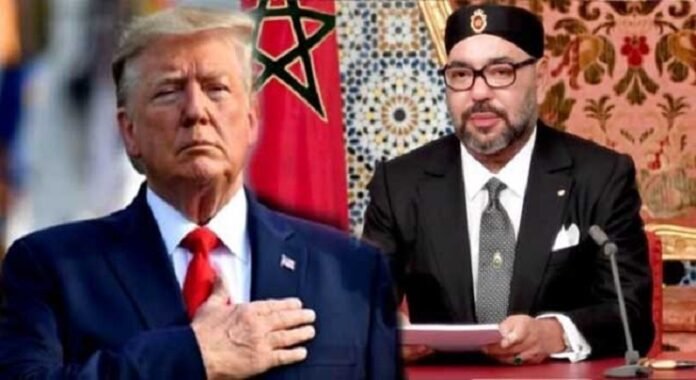In a diplomatic move that goes far beyond mere protocol, former U.S. President Donald Trump sent a clear and direct message to King Mohammed VI, reaffirming the United States’ firm support for Morocco’s full sovereignty over its Sahara. While the letter came on the occasion of Throne Day, it carries strategic implications that transcend symbolism, highlighting deep geopolitical shifts in the region. It confirms that Morocco’s autonomy initiative is no longer just a negotiation framework—it is now seen by global decision-makers as the only serious, credible, and realistic solution.
A Strategic Recognition That Cannot Be Reversed
Trump’s message reaffirms a bold decision made in December 2020 when the U.S. officially recognized Morocco’s sovereignty over its southern provinces. That recognition has not only remained in place under the current administration but has been reinforced through various signs—such as high-level visits to Dakhla and major development initiatives backed by the U.S. International Development Finance Corporation.
What sets this letter apart is its repeated praise of Morocco’s “credibility and seriousness,” in stark contrast to the international silence surrounding separatist claims, which signals growing isolation of those narratives both politically and economically.
Five Billion Dollars: Investing in Sovereignty and Development
While statements are made across political platforms, money speaks more clearly: the U.S. is preparing to invest nearly $5 billion in major development projects in the Moroccan Sahara. This is not just an investment decision—it is a tangible endorsement of Morocco’s sovereignty and a direct implementation of U.S. political support.
These investments will span critical sectors such as renewable energy, infrastructure, education, and health, transforming the southern provinces into an economic hub connecting Morocco to Africa and Latin America via the Atlantic—fully aligned with the royal vision of the Sahara as a strategic gateway to the African continent.
From a Conflict File to a Regional Development Project
The Moroccan Sahara is no longer just a subject of dispute—it is becoming a space of construction and transformation. The Tiznit–Dakhla highway, Dakhla Atlantic Port, solar and wind energy plants, and green hydrogen projects all prove that Morocco is not negotiating its sovereignty—it is building on it.
These are not just infrastructure projects; they are political messages. Those who own the land are the ones developing it and involving its people in the process—not those who exploit suffering to sustain a fabricated conflict.
Royal Diplomacy and a Strategic African Vision
The Royal initiative to establish a maritime corridor linking Morocco to Atlantic African countries is not just a geographical idea—it is a cross-border strategy that places the Sahara at the heart of African regional integration. Washington, Europe, and even China have understood this vision and are engaging with it in practical terms.
A Message to the Opponents: Realism Defeats Denial
While the Polisario Front and its Algerian backers cling to outdated narratives, the international tide is shifting in favor of Morocco. Recognition of Moroccan sovereignty is growing—not only diplomatically, but through concrete development action. Trump’s message is not just an isolated opinion—it encourages other countries to follow suit and gives further momentum to Morocco’s diplomatic efforts in global forums.
Conclusion: Sovereignty is Built Through Legitimacy and Development
The U.S. message underscores that Morocco’s approach to the Sahara issue is based on historical legitimacy, integrated development, and strong social cohesion. This model is attracting investment, while other projects fall into the traps of separatism and militarization.
The key takeaway: the Sahara issue is not just about diplomacy or law—it is a battle of political models. Morocco is proving, day after day, that it relies not just on external backing, but on the strength of its vision, the resilience of its development path, and the unity of its people behind their national cause.


